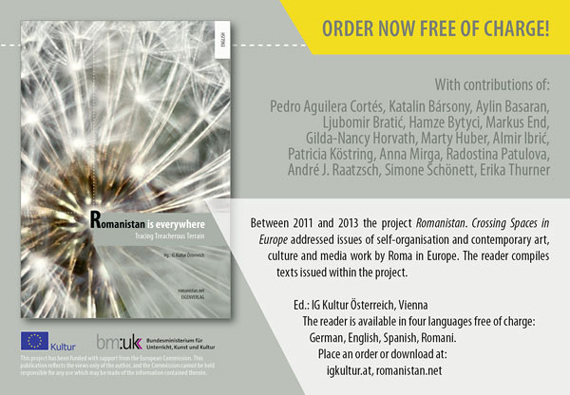|
Between 2011 and 2013, IG Kultur
Österreich, together with Roma organisations from Vienna, Berlin and
Barcelona (Roma Kultur Zentrum Wien, Amaro Drom, FAGiC) carried out the
project Romanistan. Crossing Spaces in Europe.
At the end of the
project the reader Romanistan is everywhere. Tracing Treacherous Terrain
is now appearing. It addresses issues of self-organisation and
contemporary culture and media work by Roma in Europe.
The reader is available in four languages free of charge (German, English, Spanish, Romani).

Romanistan is everywhere
Tracing Treacherous Terrain Ed.: IG Kultur Österreich, Vienna
In-house publication
Vienna 2013
ISBN: 3-9500544-7-2 Europe,
as we know it today is a modern construction. After two world wars,
accompanied by destruction, expulsion and annihilation, it has yet to
deliver on its promise of democracy, undivided human rights and social
justice. There is hardly any other instance in which this is as visible
as in the realities of the Roma and Sinti. Their trajectory over
centuries, marked by marginalization and persecution, has yet to be
reversed even as institutions for all of this Europe are being created.
Racially motivated attacks and diatribes are part of everyday life in
many EU member states - a phenomenon described so aptly by Giorgio
Agamben as a state of exception in his book Homer sacer.
This terrain
is certainly treacherous – and it remains invariably difficult for the
Roma and Sinti to overcome the patterns of perception that prevail in
the majority societies, while general stereotypes are still being
reinforced by scientific disciplines. To this day, culture and media
draw from this with a pseudo-folkloristic romantization always joined by
ideas of elimination – as the backside of the same medal. The trivial
romanticism of “gypsy music”, flamenco and other exoticisms distorts the
reality of Roma and Sinti life to the point of non-recognition,
relegating it to the margins of society.
With its markings,
Romanistan speaks about a Europe that should not be left to the rule of a
state of exception. The continuity of invisibility, exclusion and
persecution requires effective ruptures. The confrontation demands a
strategic stamina, giving the Roma and Sinti the necessary space to
negotiate their own position. Today’s Europe may be impassable but it is
certainly not cast in stone… With contributions by:
Pedro
Aguilera Cortés, Katalin Bársony, Aylin Basaran, Ljubomir Bratić, Hamze
Bytyci, Markus End, Gilda-Nancy Horvath, Marty Huber, Almir Ibrić,
Patricia Köstring, Anna Mirga, Radostina Patulova, André J. Raatzsch,
Simone Schönett, Erika Thurner
|